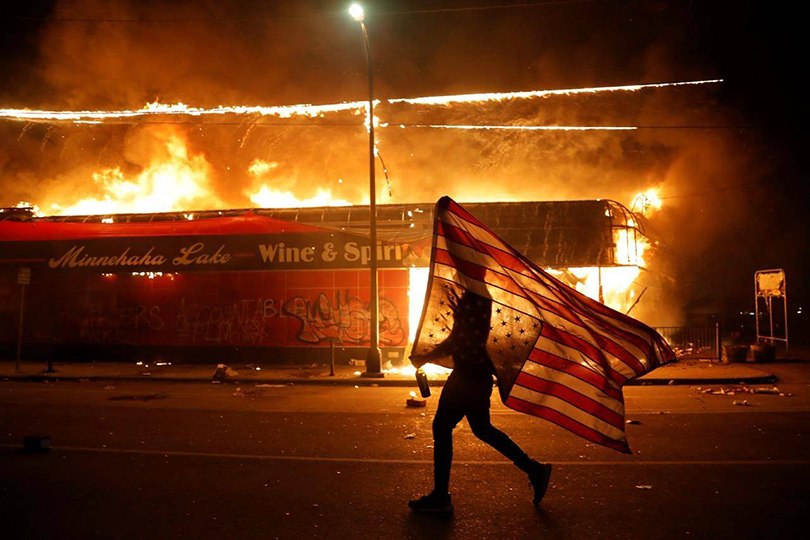On may 25th police officers in Minneapolis responded to a shop assistant’s complaint about someone passing a counterfeit bill. They arrested George Floyd, a 46-year-old black man, but instead of putting him in the back of a squad car, an officer pressed his knee to Mr Floyd’s neck for nearly nine minutes—almost three of which came after police failed to find Mr Floyd’s pulse. Mr Floyd complained that he could not breathe, called out for his late mother and eventually stopped moving.
Mobile-phone footage of Mr Floyd’s death emerged one day later, and for the ensuing four days, violent protests have wracked Minneapolis. Derek Chauvin, the officer who held Mr Floyd on the ground, was arrested on the afternoon of May 29th and charged with third-degree murder and manslaughter, and may face further charges for what certainly looks like excessive and unjustified force.
That makes him an outlier: police rarely face criminal charges for actions that might land an ordinary person in the dock. The protesters and rioters on the streets of Minneapolis see this as part of a pattern of institutional racism, in which black victims of police malpractice rarely achieve justice. But the police in fact enjoy a degree of legal protection, from a doctrine known as “qualified immunity.”
Federal law gives Americans the right to sue government officials who violate their constitutional rights. But in Pierson v Ray, decided in 1967, the Supreme Court held that public officials who commit “good faith” rights violations are entitled to “qualified immunity”, intended to shield them against frivolous lawsuits.
As the Supreme Court explained in 2015, that means that government employees cannot be sued for actions undertaken in the course of their duties, “so long as their conduct does not violate clearly established statutory or constitutional rights of which a reasonable person would have known”. That sounds sensible enough—but over time the “clearly established” part of the doctrine has almost completely subsumed the “reasonable person” part.
For instance, on September 10th 2013 police officers in Fresno, California searched the homes and business of two men suspected of running an illegal gambling operation. The men allege that police seized $151,380 in cash and another $125,000 worth of rare coins—but only reported taking $50,000, and pocketed the rest. The men sued, but the Ninth Circuit Court of Appeals dismissed the case.
The court held that it need not determine whether the men’s constitutional rights had been violated—ie, in this case whether the officers actually had stolen the property in question, which would have breached the Fourth Amendment, which promises protection against unreasonable searches and seizures. Because “there was no clearly established law holding that officers violate the Fourth or Fourteenth Amendment when they steal property that is seized pursuant to a warrant”, the two men were not entitled to relief (though the court noted, near the end of its brief ruling, “we sympathise with the Appellants”).
Or consider the case of Malaika Brooks, who was seven months pregnant, and whom police dragged from her car in front of her 11-year-old son, and tasered three times in less than a minute—because she declined to sign a traffic ticket. A panel of federal judges ruled that even though Ms Brooks’s violation--driving 12 miles per hour over the speed limit—was “not serious,” and she did not pose “even a potential threat” to anyone’s safety, the officers’ actions did not violate “clearly established” law. Small wonder that Sonia Sotomayor, the Supreme Court’s most ardent Fourth Amendment champion, called qualified immunity, as most courts have come to interpret it, “an absolute shield for law-enforcement officers, gutting the deterrent effect of the Fourth Amendment.”
Qualified immunity is hardly the only reason why police officers rarely face criminal penalties for actions such as stealing cash and coins, or repeatedly tasering a pregnant woman—actions that an ordinary citizen would almost certainly have to answer for in court. Criminal cases have to be prosecuted; prosecutors work closely with police; police tend to close ranks around their own; and a prosecutor who made enemies of his city or county’s police force would find it hard to do his job.
Police unions tend to back their brother officers. In 2014, the union in New York staunchly supported an officer caught on video choking an African-American man to death for allegedly selling single cigarettes on a street corner (sacking that officer took five years). That makes recent statements from multiple police unions expressing outrage at what happened to Mr Floyd all the more extraordinary.
The Supreme Court is currently considering whether to hear several cases concerning qualified immunity and its excesses. A diverse range of supporters—not just the usual suspects, such as the American Civil Liberties Union and the libertarian Cato Institute, but also conservative Christian groups, such as the Alliance Defending Freedom—is urging the justices to take another look at the doctrine. Effective policing requires community support, and police officers who place themselves above the law will never get it.







Comments